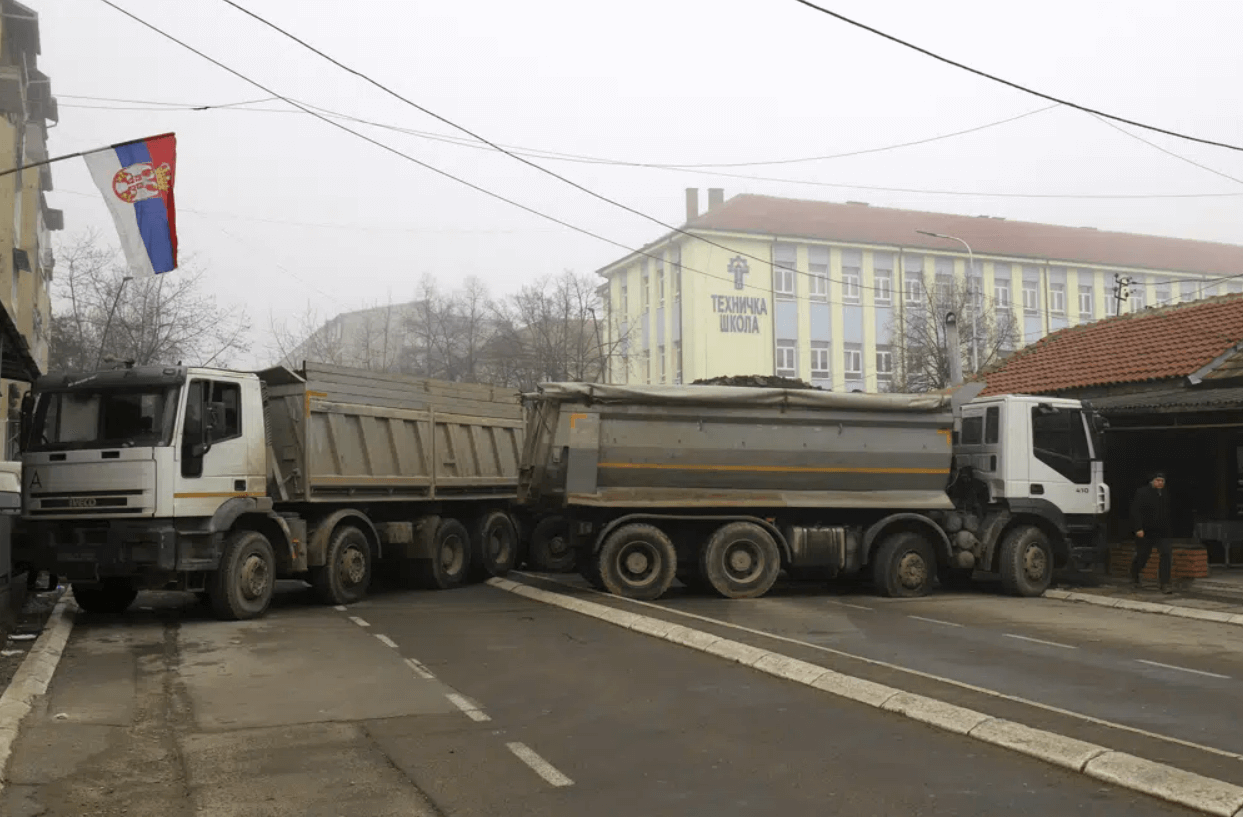On Wednesday, Kosovo closed its biggest border crossing with Serbia, the Merdare border, after Serbs on the Serbian side installed new roadblocks by parking trucks and tractors overnight in Mitrovica and in Zvecan, northern Kosovo, on Tuesday in a bid to support ethnic Serbs in Kosovo.
A police statement confirmed that “criminal groups continue to block the freedom of movement by setting up barricades throughout the night in the north of the country.” The barricades were created by protestors, who have been demanding the release of a former Serbian police officer, Dejan Pantic, and establishing an association of Serbian municipalities in Kosovo.
President Vucic said he’s considering going to Kursumlija, the municipality where the blocked border crossing is. While there are several “safety valves” in place for when such escalations occur, the saber-rattling seems to have gone a bit too far tonight. https://t.co/l6amGHVwLn
— Una Hajdari (@UnaHajdari) December 27, 2022
The roadblock prevents thousands of Kosovans, who work in other European countries, from returning to the country for the holidays. Furthermore, it is the first time that a roadblock has been created in one of the main towns instead of on roads leading to the Kosovo-Serbia border.
The move came a day after Serbian President Aleksandar Vučić announced that his armed forces are on the “highest level of combat readiness” in order to “protect our people (in Kosovo) and preserve Serbia.” “Unfortunately, they did not want to listen to us, or they were not very interested in hearing us, but they will continue to talk about the Serb barricades, which are a sign of discontent and of the Serb people’s struggle to be where they belong,” he added.
He also claimed that Kosovo is planning to “attack” Kosovo Serbs in the north, “trigger unrest and kill the Serbs,” and remove the roadblocks by force. “Their aim is to expel Serbia out of Kosovo [...] with the help of their agents in Belgrade,” he revealed in a reference to Serbia’s independent media, which has condemned his treatment of the Kosovo crisis.
Дајемо све од себе да сачувамо мир. https://t.co/4YOYlVZ8pm
— Александар Вучић (@avucic) December 27, 2022
Similarly, Petar Petkovic, a Serbian government official in touch with Kosovo Serbs, told Serbian state television RTS that heavily-armed Pristina units want to attack Kosovo Serbs, including women, the elderly, children, and men. “Our people who [are] at the barricades are just defending the right to live,” he claimed, adding that Serbian troops had only increased its level of combat readiness because Kosovo had done the same; Kosovan officials have denied this.
Nonetheless, Vučić revealed that Belgrade is in talks with the European Union (EU) and American intermediaries “on preserving peace and finding a compromise solution.” Moreover, Serbia declared that it would increase the size of its Special Operations Forces from 1,500 to 5,000 by the end of next year.
In this respect, Kosovan Minister of Internal Affairs Xhelal Svecla asserted, “It is precisely Serbia, influenced by Russia, that has raised a state of military readiness, is ordering the erection of new barricades, to justify and protect the criminal groups that terrorise citizens of Serb ethnicity living in Kosovo, in particular,” adding, “We are not interested in war, but we are committed to fighting crime and terrorism within our country.” He also called for the de-escalation of the situation at the earliest.
Finally (!), I fully agree with Ms.Osmani: democracy & the rule of law WILL prevail. Hence the barricades. Serbs are protecting their right to vote (which you took away), right to a fair trial (which you've denied), and the Brussels Agreement. They will prevail & Kurti WILL fail. https://t.co/oIZTja9uir
— Ana Brnabic (@anabrnabic) December 27, 2022
Prior to the new roadblocks, Kosovan Prime Minister (PM) Albin Kurti demanded the North Atlantic Treaty Organization’s (NATO) KFOR unit to remove the barricades. However, KFOR, which has about 3,700 troops in Kosovo to maintain calm, does not have the authority to work on Serbian territory.
“For the last 23 years, KFOR has said that it stands for peace, security, and freedom of movement. Well, now it has to prove itself in action. I think the time has come to do so. If it does not prove itself, we will have to deal with them,” Kurti emphasised, without giving a timeframe to remove the roadblocks but said that “this cannot last for months or weeks.”
Kurti also stated that the Serbian municipalities cannot be established unless Serbia recognises Kosovo’s independence, as it is “like a pie without a pan, and that cannot be done.” Tensions between Serbia and Kosovo have been increasing in the last few months, owing to the license plate row, which was resolved last month.
The fact that #Vucic’s criminal gangs blocked their part of Merdare CCP w/ Republic of #Kosovo proves sharply that the illegally erected barricades in north🇽🇰 are not a protest for lack of #Serbian community rights but rather a direct order from #Serbia/#Russia to spark conflict!
— Meliza Haradinaj (@MelizaHaradinaj) December 28, 2022
Moreover, Kosovo gained independence from Serbia in 2008, but Belgrade does not recognise it. In fact, about 50,000 ethnic Serbs in Kosovo still consider themselves to be a part of Serbia.
Since 10 December, Kosovo Serbs have been erecting multiple barricades near Mitrovica and even fired at the Kosovan police and KFOR units following the arrest of Pantic, who is accused of attacking election officials. In a statement, KFOR troops affirmed that shots were fired near their unit in Zubin Potok. However, no one was injured and no material damage was reported.

